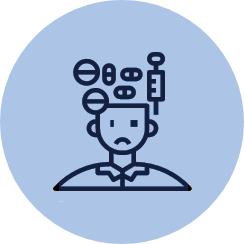Behavioral Health Residential Treatment in Orange County, California
Even though mental health is finally being taken more seriously and talked about more openly, it can still be very challenging for people to get the help they need. Many individuals who are struggling with these problems either don’t know about the valuable resources that are available to them or believe that they can get better on their own.
Although there are exceptions, the reality is that many people dealing with serious substance abuse and other mental health disorders will not be able to live happy, productive lives until they receive professional guidance and support. This is where residential treatment services like Breakwater Behavioral Health can make a massive difference. We offer residential treatment in California to help those struggling with mental health and substance use disorders.

In most cases, patients remain at residential treatment facilities for around 28 to 30 days at a time. However, this timeframe varies depending on the specific facility, the condition being treated, and the specific needs of the individual.
Sometimes, a patient’s stay may be as long as 90 days or potentially even a full year. Ultimately, the goal of these programs is for each patient to finish their stay with improved mental health and the tools that they need to find long-term peace and contentedness.
How Can Residential Treatment Address Mental Health and Substance Abuse Disorders?

Providing a Comfortable Environment
One of the ways that residential treatment facilities can help their patients is by providing them with a safe, peaceful setting for the duration of their recovery process. Often, individuals trying to overcome mental health issues on their own do not have access to safe, supportive environments. Having access to a place where you’re comfortable and secure can make it much easier to fully dedicate yourself to your recovery.

Individual and Group Counseling Services
At California residential treatment centers for behavioral health such as Breakwater, patients are provided with professional therapeutic services regularly. Live-in treatment facilities make it much easier for mental health specialists to provide comprehensive therapeutic services that are custom-tailored to the needs of each patient.
Group counseling sessions are typically a significant aspect of residential treatment facilities for behavioral health. Generally, these programs will include many people who are dealing with similar mental health issues, and group meetings allow patients to share their experiences, discuss their struggles, and support each other.

Detoxification
For patients who are dealing with substance abuse disorders, residential treatment facilities will typically offer detoxification as part of the treatment process. Detox can be an extremely difficult and volatile process, but in the controlled environment of a live-in facility, the patient can be constantly monitored and provided with any support or medical attention that they may need. This greatly increases the chances of a successful drug detox process.
Benefits of Residential Treatment
- Controlled setting for detoxification
- Safe and comfortable environment
- Around-the-clock support and guidance
- Constant presence of trained medical professionals
- Consistent peer support throughout the treatment process
- Comprehensive, personalized treatment plans for every patient
- Mental and emotional tools they need for successful long-term recovery and wellness
- Removal from the distractions and triggers of everyday life
- Structure and consistent routines
Breakwater Behavioral Health Offers Luxury Residential Treatment
Our program provides supervised detoxification, personalized therapeutic services, and evidence-based treatment strategies designed to help each individual find long-term success. At our clinic, you or your loved one will be able to focus entirely on recovery in a peaceful, stress-free environment. If you’re ready to start your journey toward a healthier, happier lifestyle, don’t hesitate to contact Breakwater Behavioral Health today.

